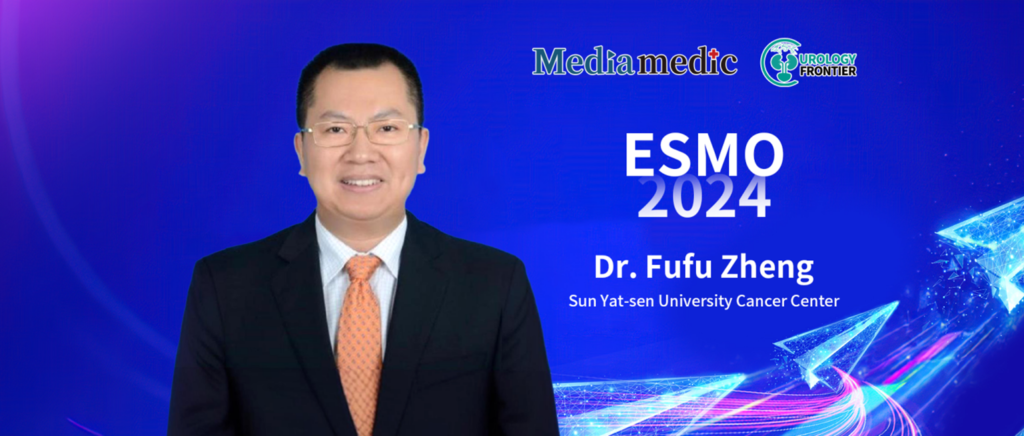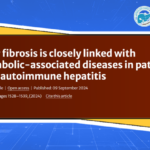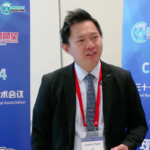
Editor's Note: The 2024 European Society for Medical Oncology (ESMO) Annual Meeting is being held from September 13-17 in Barcelona, Spain. Several key studies in the field of urologic cancers have attracted significant attention at the conference. Urology Frontier invited Dr. Fufu Zheng from the Department of Urology at The First Affiliated Hospital , Sun Yat-sen University to provide in-depth analysis of the major research findings presented at the conference. Professor Zheng shared his team’s latest breakthroughs in the field of urology, particularly regarding the frontier advancements in combination therapies for advanced renal cell carcinoma (RCC), while also offering insights into the promising future of RCC treatment.Urology Frontier : Which urologic cancer studies from this year’s ESMO conference caught your attention?
Dr. Fufu Zheng: Three major studies presented at the ESMO conference could provide valuable insights for both clinical practice and research in urologic cancers.
First, in the field of prostate cancer, the preliminary results from the EORTC-GUCG 1333/PEACE-3 clinical trial (LBA1 – A randomized multicenter open-label phase III trial comparing enzalutamide vs. a combination of Radium-223 (Ra223) and enzalutamide in asymptomatic or mildly symptomatic patients with bone metastatic castration-resistant prostate cancer (mCRPC): First results of EORTC-GUCG 1333/PEACE-3) are very encouraging. This phase III study is designed to evaluate the efficacy of combining Radium-223 with enzalutamide compared to enzalutamide alone in asymptomatic or mildly symptomatic patients with bone metastatic castration-resistant prostate cancer (mCRPC). The significant improvement in the primary endpoint of radiographic progression-free survival (rPFS) suggests that this combination therapy could offer a more positive treatment outlook for advanced mCRPC patients, adding a powerful new tool to the prostate cancer treatment arsenal.
Second, in bladder cancer, the breakthrough findings from the NIAGARA trial (LBA5 – A randomized phase III trial of neoadjuvant durvalumab plus chemotherapy followed by radical cystectomy and adjuvant durvalumab in muscle-invasive bladder cancer (MIBC)) also stand out. This phase III trial explored the use of neoadjuvant durvalumab combined with chemotherapy, followed by radical cystectomy and adjuvant durvalumab in patients with muscle-invasive bladder cancer (MIBC). The results demonstrated a significant extension in event-free survival (EFS) and overall survival (OS) in the combination group compared to neoadjuvant chemotherapy alone, without negatively impacting surgery completion rates. These findings strengthen the role of immunotherapy in bladder cancer treatment and provide crucial guidance for comprehensive treatment strategies in MIBC.
Lastly, in renal cancer, the preliminary results from the TACITO trial (LBA77 – Fecal microbiota transplantation (FMT) versus placebo in patients receiving pembrolizumab plus axitinib for metastatic renal cell carcinoma: Preliminary results of the randomized phase II TACITO trial) revealed the potential role of gut microbiota in enhancing the response to immunotherapy. The study investigated whether fecal microbiota transplantation (FMT) could improve the efficacy of VEGFR-TKI and immune checkpoint inhibitor (ICI) combination therapies in patients with metastatic renal cell carcinoma (mRCC). The initial results suggest that FMT might help boost the response to ICI-based therapies in mRCC patients, opening new avenues for research in advanced renal cancer treatment by highlighting the importance of the gut microbiome in cancer immunotherapy.
Urology Frontier: Can you share any significant breakthroughs or key developments your team has recently made in the field of urology?
Dr. Fufu Zheng: Our team has been actively conducting cutting-edge research in urology, particularly focusing on kidney and prostate cancers. For high-risk localized kidney cancer, we are working on developing models for adjuvant therapy post-surgery, aiming to improve patient prognosis through precision treatment. We’ve also delved into prognosis and efficacy evaluations for non-clear cell renal cell carcinoma, which is of great significance for optimizing treatment plans and enhancing therapeutic outcomes. Although some of our data has not yet been officially published, our research is progressing steadily, and we are hopeful that it will provide new clinical treatment strategies in the near future.
Additionally, some of our graduate research teams have been conducting innovative studies in prostate cancer, especially in the application of PSMA PET/CT imaging. We are using PSMA imaging to predict post-surgical outcomes, biochemical recurrence, and subclinical recurrence in patients with locally advanced or high-risk prostate cancer. This exploration not only allows for more accurate prognosis assessments but also provides strong support for developing personalized treatment plans.
Urology Frontier :Many studies are currently exploring the potential of combination therapies for advanced metastatic renal cancer. What progress from the ESMO conference is worth highlighting, and could you provide a detailed analysis?
Dr. Fufu Zheng: At the ESMO conference, significant progress has been made in combination therapy research for advanced metastatic renal cell carcinoma (aRCC). Besides the TACITO trial I mentioned earlier, two additional studies are particularly noteworthy.
First, the ETER100 study (LBA76 – Anlotinib in combination with anti-PD-L1 antibody Benmelstobart (TQB2450) versus sunitinib in first-line treatment of advanced renal cell carcinoma (RCC) – A randomized, open-label, phase III study), led by Professor Xin Nan Sheng from Peking University Cancer Hospital, compared anlotinib combined with the anti-PD-L1 antibody Benmelstobart (TQB2450) versus sunitinib in first-line treatment of advanced RCC patients. The results showed that the combination therapy significantly extended progression-free survival (PFS), offering a new treatment option and hope for patients with advanced RCC.
Second, the CheckMate 9ER study (1694MO – Novel serum glycoproteomic biomarkers predict response to nivolumab plus cabozantinib (NIVO+CABO) versus sunitinib (SUN) in advanced RCC (aRCC): Analysis from CheckMate 9ER) also produced exciting results. This study examined the role of protein fucosylation and sialylation mechanisms in driving resistance to nivolumab plus cabozantinib or sunitinib in advanced RCC. Importantly, the study found that serum glycoproteins involved in complement cascade and lipid metabolism could serve as key biomarkers to predict patient response to nivolumab plus cabozantinib or sunitinib. This discovery not only provides new insights into understanding resistance mechanisms in RCC but also offers a solid foundation for future individualized treatment strategies.
Urology Frontier: In your opinion, what advancements in the treatment of advanced renal cancer are most likely to significantly change clinical practice in the future?
Dr. Fufu Zheng: The treatment of advanced renal cancer is undergoing numerous innovations and breakthroughs, which are likely to profoundly alter clinical practice in the coming years. First, the diversification of therapeutic approaches, ranging from single-target therapies to combination regimens involving targeted and immune therapies, offers more treatment options. However, the key challenge now is how to select the most appropriate treatment regimen for each patient, making precision medicine a hot topic in research.
We are gradually uncovering the molecular mechanisms underlying renal cancer through genomic sequencing, RNA sequencing, mutation analysis, and immunohistochemistry, which will allow for more precise stratification of treatment. Specifically, gene sequencing has revealed that variations in genes like VHL, BAP1, SETD2, and PBRM1 are linked to renal cancer prognosis, but these findings do not yet encompass all types of renal cancer. In the future, we may adopt multi-gene panel testing to provide a more comprehensive prediction of treatment outcomes. RNA sequencing has also enabled us to classify renal cell carcinoma into seven subtypes, which is crucial for guiding treatment decisions. For example, some subtypes may be more responsive to single-agent TKI therapy, while others might benefit from combination therapies, thus avoiding unnecessary overtreatment and reducing the financial burden on patients.
The application of single-cell sequencing and whole-exome sequencing technologies will further refine patient-specific genomic information, facilitating the development of more personalized treatment plans. Biomarkers like kidney injury molecule-1 (KIM-1) are also showing promise in renal cancer treatment and prognosis evaluation. The IMmotion 010 study, for instance, suggested that high KIM-1 expression is associated with poor prognosis and may help distinguish between benign and malignant tumors. Although not yet applied in clinical practice, this finding provides important clues for future adjuvant therapy strategies, aiding us in more accurately assessing patients’ treatment needs.
Finally, advancements in imaging technologies, such as CT texture analysis (CTTA), are playing an increasingly important role in treatment decision-making for advanced renal cancer. Through CTTA, we can more accurately evaluate patient responses to treatment and disease progression, allowing for more individualized treatment strategies.
In summary, with the ongoing research and technological advancements, we have reason to believe that the five-year survival rate for patients with advanced renal cancer will significantly improve in the future.
Dr. Fufu Zheng
Chief Physician, PhD Supervisor, Postdoctoral Supervisor Department of Urology, The First Affiliated Hospital , Sun Yat-sen University Visiting Scholar, Massachusetts General Hospital, Harvard University International Member, American Urological Association (AUA) Committee Member, Urogenital Division, Chinese Medical and Health International Exchange Promotion Association Deputy Leader, Prostate Cancer Group, Guangdong Medical Association Urology Division Committee Member, Urology Division, Guangdong Medical Doctors Association Committee Member, Urogenital Oncology Division, Guangdong Anti-Cancer Association Standing Committee Member, Urology Division, Guangdong Association of Integrated Chinese and Western Medicine Standing Committee Member, Oncology Division, Guangdong Urogenital Association Executive Editorial Board Member, Journal of Urology (Electronic Edition) Peer Reviewer, Chinese Journal of Experimental Surgery


